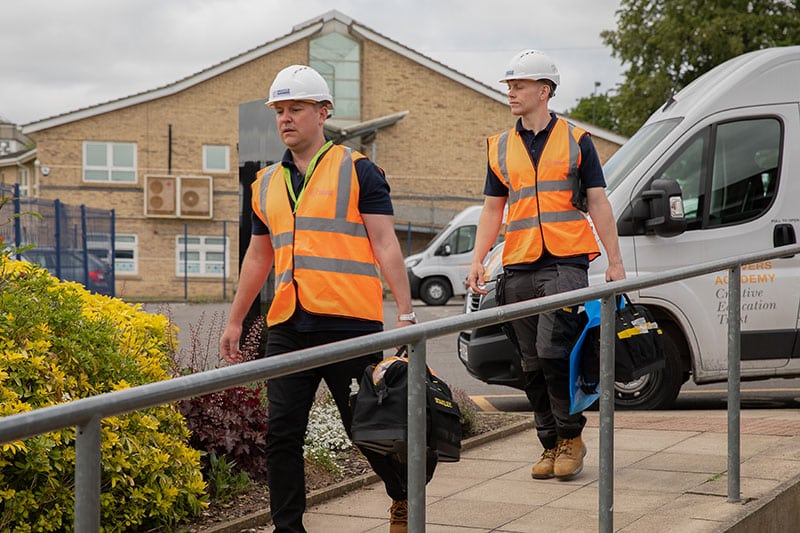What questions should I ask asbestos contractors to ensure they follow best practices?
Hiring a qualified asbestos worker is absolutely necessary to reduce the risk of asbestos exposure. If asbestos materials aren’t handled properly, they can release dangerous fibres into the air. Once inhaled or ingested, those fibres can adhere to the lungs and cause life-threatening diseases in the future.
Additionally, duty holders and property managers must hire qualified asbestos contractors in order to stay compliant with legal guidelines. As the duty holder of a building, you’re responsible for maintaining a safe environment. If you hire contractors without doing your due diligence, you could be held liable for improper management of asbestos materials.
Add the following questions to your list of what to ask asbestos contractors.

Is the contractor licensed and accredited?
Certain types of asbestos work require licensing from the Health and Safety Executive (HSE). In general, medium- to large-scale asbestos projects require contractors to have a licence.
The type of asbestos being worked with matters as well. For example, asbestos insulation is particularly dangerous to work with because it must be broken up in order to be removed. This raises the risk of asbestos exposure and makes licensing a prerequisite.
Additionally, certain asbestos jobs require accreditation to the standards set forth by the Control of Asbestos Regulations 2012. Only accreditation by the United Kingdom Accreditation Service (UKAS) is acceptable.
What experience does the contractor have with similar projects?
When interviewing asbestos contractors, it’s important to find out what types of buildings and properties they have experience with. Ideally, you’ll want a contractor or team that has a lot of background with your type of property.
Asbestos management is different based on building type, whether that’s commercial, residential, or historic. For example, a commercial residence may have a lot of employees and visitors accessing the building regularly, and you may have to advise the duty holder of where to relocate the business while the asbestos work takes place.
Overall, contractors will have the highest level of skills and understanding regarding the property type they’re most experienced with.
Can the contractor provide detailed method statements and risk assessments?
You should only hire a contractor who’s willing to give you a method statement and risk assessment of the planned asbestos project.
These two documents are a bit different:
- Method Statement: Outlines how the asbestos project will be performed safely. Common in high-risk industries like asbestos removal.
- Risk Assessment: The asbestos surveyor will find and assess the presence of asbestos on the property to determine where it is, its condition, and the risk of exposure during normal activity and planned projects.
Moreover, the documentation you receive should be site-specific. While a general overview may be helpful before hiring the contractor, they should provide you with personalised information once hired.
What procedures does the contractor follow for asbestos surveying?
There are three main types of asbestos surveys. Knowing what they are will help you determine if the contractor is planning to conduct the right type of survey for the job.
- Management Asbestos Survey: This type of survey is best when you need to manage asbestos-containing materials (ACMs) during normal occupation and activities.
- Refurbishment or Demolition Asbestos Survey: This survey is necessary if major work is planned on the building. It will determine which ACMs are at risk even if they’re currently not damaged or disturbed.
- Re-Inspection Asbestos Survey: This type of survey is helpful for ongoing asbestos management. It should occur at least annually, and if there are any changes to the ACMs, it should be conducted as soon as possible.
On top of conducting the right type of asbestos survey, planning, surveying and reporting should follow the guidelines in HSG264 from the HSE.
How will the contractor ensure compliance with current regulations?
The Control of Asbestos Regulations 2012 outlines asbestos laws in the UK. The HSE has detailed guides and documents to ensure contractors and duty holders are able to stay compliant.
Any asbestos contractor you hire should be well-versed in the UK’s asbestos regulations. Don’t hesitate to ask them how they stay up-to-date with regulatory changes, either.
Furthermore, find out how they stay compliant during each phase of an asbestos project. For example, surveying and sampling ACMs have different requirements than removal work. Disposal and post-work cleanup also must be performed in accordance with CAR 2012.
What training and qualifications do the contractor’s team members hold?
Working with asbestos can pose a great risk to the contractors and anyone else in or near the building. It’s crucial that you only hire asbestos experts with the proper training and qualifications.
A few of the specific certifications from the British Occupational Hygiene Society (BOHS) to look for include the following:
- P402: This course provides background information and background knowledge for asbestos surveying. It also offers general management guidance to avoid asbestos exposure.
- P402RPT: This training goes over how to write reports after surveying for asbestos.
- RP404: This training covers air sampling post-asbestos work to issue a certification of reoccupation.
The BOHS website has a tool that lets you search by company name to find out if they’re approved or not.
What measures will be taken to ensure health and safety on site?
There are a number of questions you can ask to learn about the contractor’s health and safety policy, including:
- What certifications do you hold that specifically relate to health and safety?
- How do you keep your workers and building occupants safe during asbestos work?
- What personal protective equipment (PPE) and respiratory protective equipment (RPE) do your team members use?
- How do you dispose of asbestos waste?
- What happens during an emergency or if there’s an unexpected asbestos exposure incident?
- Do you have a copy of your company’s health and safety policy that I can keep for my records?
Only consider hiring an asbestos contractor or company if they have thorough documentation, a solid plan for preventing an exposure incident, and are forthcoming with the information.
How does the contractor handle waste disposal and environmental responsibility?
Asbestos waste disposal is part of any asbestos project. Without proper disposal methods, asbestos fibres can contaminate the building, the environment, or both.
Ask about their waste disposal procedures. In general, the HSE’s guidelines require or provide guidance for the following:
- Approved packaging for asbestos waste
- Double-wrapping asbestos waste
- Clearly labeling asbestos waste
- Licensing required to transport asbestos waste
- The type of vehicle necessary to transport asbestos waste
- Where you can dispose of asbestos
Also, as you speak with potential contractors, determine if they take environmental responsibility seriously and if they seem to follow waste-reduction strategies.
What is the contractor’s approach to communication and reporting?
Your asbestos contractor should clearly communicate with you before, during, and after the project. This includes providing important reports, such as:
- Survey Report: This will include information about which parts of the property were accessed and how many samples were taken per area or per room.
- Air Monitoring Report: This report will include information about the quality control measures put in place, the process used for air sampling, and the results of the testing.
- Clearance Certificate: The four-stage clearance process will produce a certificate confirming the work is finished and that the area is safe for reoccupation.
Ask the asbestos company how you will be kept informed of the safety and status of the project on a regular basis.
Can the contractor provide references or testimonials from previous clients?
Never hesitate to ask a service provider for references. You should also research the company to find ratings and reviews. Read through several of them to get a sense of the experience you’re most likely to have with the company.
There are several reasons to ask for references, such as:
- You’ll be able to verify the claims the contractor made or determine that the company does not deliver on their promises.
- You’ll learn about the quality of work the company provides, including how well they communicate with clients.
- Past customers will be able to tell you how the company resolved problems.
When speaking with references and reading reviews, remember to only heed the advice of credible customers. It can help to cross-reference reviews to see which positive or negative sentiments have been repeated.
Final thoughts about hiring asbestos contractors
Asking your potential asbestos contractor questions like the ones we’ve gone over above can help you assess their competence, compliance, and value. Plus, evaluating their safety measures and learning about their procedures can build trust in the contractor if you feel that they take the health risks of asbestos seriously.
It’s always wise for duty holders and property managers to take an active role in ensuring best practices are met. While you’re not required to know as much about asbestos as contractors do, you are responsible for the safety of the building, including hiring capable asbestos workers.
Lastly, it’s helpful to document the questions you ask the contractors and their answers. This will make it easier to assess the responses and hire a qualified company.

Written by Brendan Coleman
Brendan Coleman, with decades of experience in the asbestos industry, is a dedicated Quality Manager. Certified as a surveyor and analyst, he is adept in operations and quality management with a keen focus on HSE compliance. His expertise is pivotal in maintaining high safety and efficiency standards. Brendan ensures our UKAS accreditation requirements are consistently met and exceeded, upholding stringent standards in asbestos remediation. His commitment to enhancing quality and customer satisfaction makes him an essential advisor in asbestos management.
